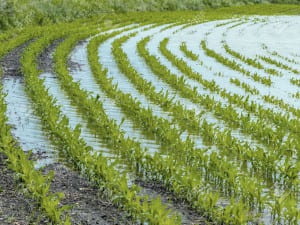Flooding can have detrimental and costly effects on agriculture. In the spring of 2012 in Somerset, England, after a long period of dry weather, they experienced heavy and prolonged rainfall. The rainfall caused many issues for farmers and the land made for agriculture. Livestock was evacuated in an emergency off of the properties and was relocated in housing to be in flood free areas. Some areas lost their entire pastures and grass areas. This affected the production of hay and silage making for 2012. Loss of yield caused a drop in production. The loss of products not only made it hard for the farmers to provide for their families but also limited the amount of food for consumers. Drainage systems became damaged and impacted the infrastructure. The soil damage was beyond repair. “Loss of beneficial soil invertebrates, especially earthworms, increased risk of animal disease, such as liver fluke infestation (fasciolosis).” 
All of this damage can lead to extreme costs on the environment and a major impact on the revenue in the agriculture industry. The animals, land made for agriculture, and the consumers are a few of the many things affected by flooding. People lose their jobs on farms and prices for crops increase as a result. With the climate constantly changing, farmers are seeing more abrupt flooding across the world. J, Morris exlained, “It is important to have a clear understanding of the impacts of flooding on agricultural land, even where farmed extensively. Otherwise, many rural areas could become flood risk ‘Cinderellas’, neglected and potentially exploited.”
Morris, J., & Brewin, P. (2014). The impact of seasonal flooding on agriculture: The spring 2012 floods in S omerset, E ngland. Journal of Flood Risk Management, 7(2), 128-140.
Aubrey Geiger


